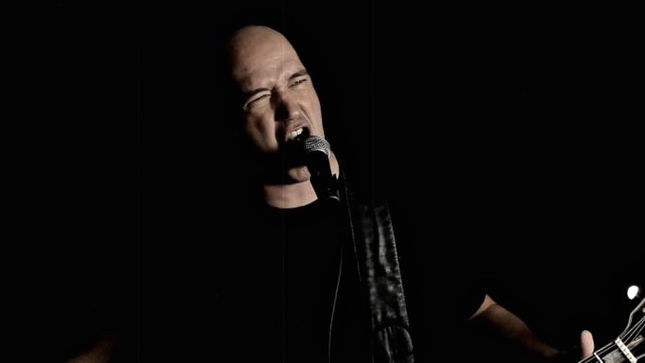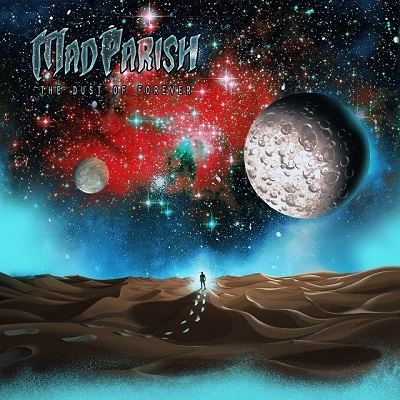NARCOTIC WASTELAND – “Addiction Is The Problem”
November 2, 2017, 7 years ago

When Narcotic Wasteland released their eponymous debut in 2014, vocalist / guitarist Dallas Toler-Wade was still the frontman for Nile. As such, it was relegated to side project status. Now, in 2017, Dallas has left Nile, making Narcotic Wasteland and their extreme death metal sophomore disc, Delirium Tremens, his top priority.
Delving into the new album - which is chock full of intensity, technicality, and speed - the title Delirium Tremens doesn’t exactly roll off the tongue smoothly. “There’s been a lot of different interpretations of it. Delirium Tremens is how they describe someone who’s got really bad shakes from withdrawing from heavy alcohol use,” explains Dallas. “The word derivative is night tremors; that’s where it kind of comes from. When me and Chris (Dupre), the bass player, were talking, that came up. I told him I had started working on a set of lyrics about withdrawals. If you actually get Delirium Tremens, there’s a high chance you’re not going to survive. If someone is that dependent on, it’s usually alcohol – there have been some cases of it with opiates, but usually it’s alcohol. If someone’s that far gone… if somebody’s been drinking really, really heavily for a very long time, for them to just stop suddenly is a serious shock to the system. If you go into a treatment center, they have ways to smooth that out for you.”
“But if you try to go cold turkey on your own, and you’ve been say, putting away at least a bottle of Jack and half a case of beer every day for a year or two… While I like to enjoy drinking, I could never imagine drinking that much. It would absolutely kill me within the first week. I don’t even understand how anybody can drink that way, but there are people out there who can drink like that. That’s what the title track is basically talking about, someone experiencing the beginnings of Delirium Tremens and having to give back into that alcohol in order to stop it. I think a lot of people have seen either friends or family go through some serious hardships due to the excessive abuse of alcohol.”

The cover art is obviously a play on the caduceus; the symbol for medicine in The United States – with the skull representing death – as opposed to life, which medicine is supposed to preserve and improve. “Me and the bass player Chris were talking about what we wanted to do with the album art. We kind of both collectively stumbled on this idea of the symbol; then we were wondering… that had to have been done before? Someone had to have used that on an album cover before. It was Motley Crue – Dr. Feelgood. We decided we could do our own spin on it, and still be kind of original. The feathers barely hanging onto the bone, and the old needle; it came out great. We’re really, really happy with it.”
Delirium Tremens was inspired by – but not entirely based on – the addiction epidemic in The United States, more specifically the unstable drug culture in Dallas’ hometown of Fayetteville, North Carolina; he lives in South Carolina now. The current opioid crisis is dominating the news on an almost daily basis, how is Fayetteville different from any other city in The United States or Canada? “You know, that’s really a good question. I figured this was probably not just happening in one place. It was just the place that I experienced it. But I always had a feeling that the Wasteland was in a lot of different areas to certain varying degrees. There is a rise of heroin again, and opiates. They tried to control the pharmaceutical end of the opiates – the prescribed drugs, because people were abusing it. Since they can’t get it from their doctor, they’re turning to the street. It’s becoming a serious thing.”
“When I grew up, there was a lot of crack and meth, a lot of nasty stuff like that going on closer to the city; I lived a little bit out of the city. It was a really dangerous area to go into. But you’re right, this new thing isn’t that new, it’s just becoming more noticeable because it’s getting more out of hand. I remember one of my relatives, when I was a very young child, he was in his 60s and he was addicted to some kind of pill; I think it was Percocet, some kind of painkiller. It occurred to me as I’d been working on this, that it has been going on for a really long time. It just seems like the past five years or so, people are really starting to pay attention to it, and you’re starting to see more coverage on this. It’s because people are losing their friends and family to the stuff. What’ll happen is people start taking these pills, then go out and drink their regular load of alcohol… they end up blacking out, crashing their car, or dying. It’s just insane."

Lyrical subject matter is of utmost importance to Narcotic Wasteland, yet the mind-blowing music holds equal weight. “Narcotic Wasteland is kind of representative musically of some of the things I was doing in the early ‘90s,” admits Dallas. “It’s just refined a bit; the tuning is a little more normal. Some of the songs are only a half-step below standard E, some of them a full step. It’s getting back into my roots; just trying to find the heavy notes. There is a lot of crazy fast stuff on there. Our drummer Phil (Cancilla) – after Eric (Schultek) left, I thought maybe I shouldn’t worry so much about the speed cause it’s very difficult to find a drummer who can play like that. There’s only a handful in the world who can really do that, but I ran across this guy who was already on my Facebook friends list. He was posting videos of himself playing various stuff, anything from video games to doing covers of some other extreme metal. I contacted him, he was interested, I sent him the stuff, and he got the gig. I think I was already three or four songs into this new one, just kept on plugging away at it. The thing I definitely wanted to do was keep a little bit of variety; I didn’t want it to be 100 miles per hour the entire time. You have songs in there that are a little bit more on the mid-pace with some double bass action going on. Then you have ‘Bleed And Swell’, which is one of my favourites; that’s like 110 beats per minute, it’s a slow rocker. It lets the listener breathe a little bit, and it proves to me that it doesn’t have to be fast and technical to be heavy. The music in the song, and what the song’s about is actually a really heavy topic.”
“Overall, it probably took about a year in the making for the actual writing process. Then in the studio, it took about four or five days to track the drums. To do the guitar work and vocals, probably another week and a half. I don’t have this big hard-on about trying to do things in one take. You’re in a studio for a reason. I don’t do a lot of copy and paste or anything, if the part repeats, I’ll play it again, just to give a little different spin on it. But I do like to use punch-ins. I play for as long as I can, then when I screw up, I punch-in right there. That’s pretty standard in the studio. Sometimes you get lucky and you get a really large take. Even though I do practice extensively before that big R button is on my back; we call it Red Light Fever. That thing’s got the weight of a mountain. I practice and go in and do the best I can. If I screw up, I punch-in, or I do it again. It’s already a lot of pressure. When you’re recording demos, you can do perfect takes all the time. As soon as you hit that record button, it’s going to fly apart.”
“We Agnostics” is an interesting song, as agnostics claim neither faith nor disbelief in God. “What actually inspired that song is there’s a chapter in the Alcoholics Anonymous book called, We Agnostics. It’s basically trying to explain… a lot of agnostics or atheists, they do not believe at all in any kind of higher power, which actually in the book – there are things that are more powerful than we are. To assume that there isn’t, is actually kind of arrogant. But I twisted it for the song a little bit. I talked to a recovering alcoholic after working on the song for a while, they were saying, ‘yeah, that makes perfect sense.’ One of the lines in the song is, ‘the only higher power I see is a bottle of whisky.’ During the course of the song and the lyrics, the bottle of whisky becomes more powerful than that person because they’re being rendered straight to the ground.”
Alcohol and opioids are giant focal points for Narcotic Wasteland, however the legalization of marijuana is a hot topic in both Canada and The United States right now. “There is a mention of it in the final song on the album, ‘Pharma Culture’. The line goes, ‘The hypocrites imprison us for the use of a natural plant, while pharmaceutical drugs kill more people than all street drugs combined.’ It does mention that, just briefly. Some of the early press that the band got, people were thinking we were this anti-drug, anti-party band; that’s not the case at all. We’re not straight-edge or anything like that. I occasionally smoke pot from time to time. It’s not something I do every day, but yeah, I like to smoke every now and then. And I enjoy my beer, or whatever. The real thing we’re sticking our fingers at is addiction overall. Addiction is the problem. Absolutely, if alcohol is legal, damn right marijuana should be legal. There’s all these medical uses for it, but they don’t want that, mostly because these big pharmaceutical companies aren’t going to make any money on it. It doesn’t have anything to do with our state of wellbeing, or our health; it has to do with their money. That’s one of the reasons why it’s been an uphill battle to legalize something as benign as marijuana. Marijuana – you get high on it, but it’s not like you’re completely not functional. Well, there is some of that stuff they’ve got nowadays. Chances are you’re going to smoke a little sativa, maybe eat something, masturbate, and catch a nap. It’s pretty harmless.”
Useful links: Addiction Rehab In London, UK











